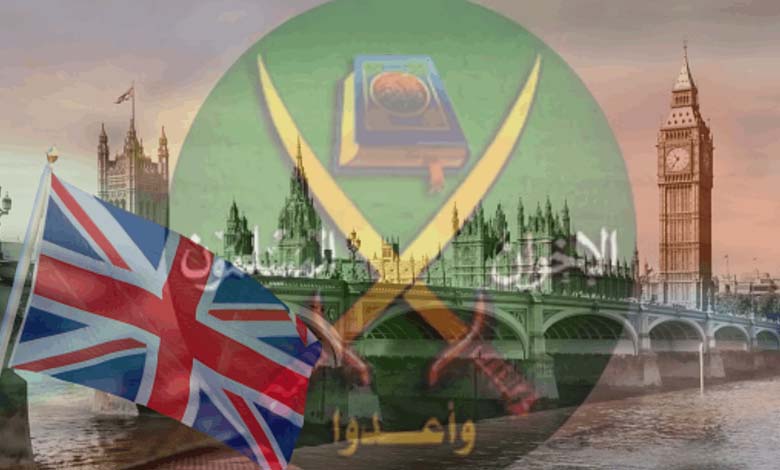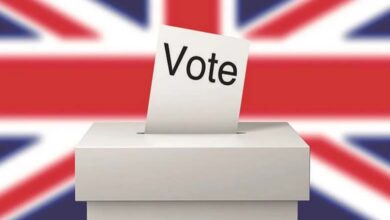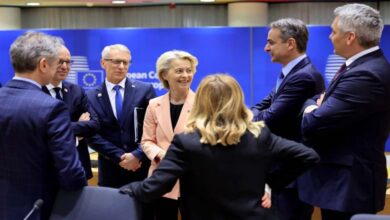The Growing Influence of the Muslim Brotherhood in Britain: Urgent Warning and a Recovery Prescription

The Muslim Brotherhood’s threat is not confined to the Middle East. It extends to the West, where the group seeks to infiltrate communities and local politics, making it an urgent issue to address.
Under the headline “Britain Must Recognize the Expanding Influence of the Muslim Brotherhood,” British political analyst Ghanem Nuseibeh warned that the UK can no longer remain on the sidelines while other nations take measures against the group, which many classify as a terrorist organization.
-
After the ban on Hizb ut-Tahrir… What is the fate of the Muslim Brotherhood in Britain?
-
Muslim Brotherhood and Zionism: Why Britain Supports Them
In an article published on Britain’s LBC radio website, Nuseibeh wrote: “Since its founding in 1928, the Brotherhood has consistently pursued its slogan, ‘Islam is the solution.’ It began in Egypt but quickly spread wherever Muslim communities existed, including Britain.”
He added: “Although the Brotherhood presents itself as a peaceful and democratic movement, its ideology, practices, and activities within Western societies have generated widespread controversy.” He noted that their declared aim is to establish a state governed by Islamic law under a caliphate, grounded in values that include antisemitism and hostility toward Christianity.
-
The Telegraph Exposes the Muslim Brotherhood’s Game in Britain: Moderation in Public, Radicalism in Private
-
Raghad Al-Tikriti… Satan’s Ally in Britain and the Distinct Face of the Muslim Brotherhood
A strategy of infiltration
According to Nuseibeh, the Brotherhood’s strategy has two main dimensions: mobilizing grassroots support and expanding influence.
The first involves exploiting social causes to penetrate communities, by running mosques and providing services such as sports clubs and language schools, until they become a core part of society.
The second is focused on influence—particularly within government and local councils—by exploiting loopholes to shape policies in their favor.
-
The Emergence of Women’s Role in European Muslim Brotherhood Networks, Especially in Britain
-
Labor, Espionage, and Assassinations… A Book Unveiling Britain’s Relationship with the Brotherhood Since Its Inception
Threats to Britain and international precedents
Nuseibeh points to France, where a government report warned of “gradual infiltration.” President Emmanuel Macron tasked his administration with devising responses to this challenge.
He argues that a similar pattern is playing out in Britain, where the Brotherhood is using the same methods to exert influence at multiple levels of governance.
Current threats and a recovery roadmap
The analyst stresses that the Brotherhood’s push for a legal definition of “Islamophobia” is part of their broader strategy—seeking to criminalize criticism of Islamism while portraying the West as corrupt and hostile to Islam.
-
The Muslim Brotherhood intensifies its activities to maintain influence in Britain… What’s New?
-
Black propaganda: how Britain used the Brotherhood to distort Islam
He observes that Britain lacks a clear strategy to counter this danger. A 2015 government report concluded against banning the Brotherhood, unlike several Arab countries that list it as a terrorist organization. He calls for a comprehensive review of Brotherhood activities in Britain, similar to France’s report, and for the development of a national action plan to safeguard security.
Nuseibeh recalls that while some members of today’s Labour government downplay the issue, former Prime Minister Gordon Brown had banned the late Yusuf al-Qaradawi, the Brotherhood’s spiritual leader, from entering the UK. He also noted that Turkey recognized the threat and cracked down on Brotherhood activities, prompting many of its members to relocate to Britain, particularly as intolerance toward the group increased in France.
-
Women Exploited by the Muslim Brotherhood to Circumvent European Immigration Laws
-
The Muslim Brotherhood in Europe and Youth: A Long Arm with 31 Branches and a Recruitment Strategy
He concluded that without decisive government action to ban the Brotherhood, the threat will persist and their influence will grow further, endangering moderate Muslim communities as well as the core democratic values of Britain itself.
Toward prohibition?
Earlier this month, Nigel Farage, leader of the Reform Party, pledged to ban the Muslim Brotherhood by designating it a “terrorist organization” if elected prime minister.
His statement aligned with a broader Western recognition of the dangers posed by the Brotherhood, reigniting the debate on outlawing the group internationally.
-
The Muslim Brotherhood in Europe and Youth: An Extensive Arm with 31 Branches and a Structured Recruitment Strategy
-
An Unprecedented Pact: Britain and Germany Move Toward Joint Defence
Amr Abdel Moneim, a researcher in political Islam, said that Farage’s remarks reflect a heightened awareness of the Brotherhood’s growing threat in Western countries. He explained that in Britain, the group operates on three main fronts: charitable work, human rights organizations, and media activities, while also playing an important role in investment.
-
Funding of Extremist Associations Shakes Belgium: Is the Country Moving Toward Banning Muslim Brotherhood Branches?
-
Sources Reveal the Truth Behind Moataz Matar’s Alleged Arrest: Extradition Rumors and Muslim Brotherhood Moves












